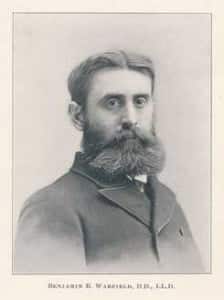Born in Rendham, Massachusetts on March 13, 1918, Thomas G. Cross was educated at Hampton Sydney College and went on to prepare for the ministry at Faith Theological Seminary. In a ministerial career that spanned fifty years, the Rev. Thomas G. Cross was instrumental in establishing forty churches across the United States. He was ordained by the Bible Presbyterian denomination in 1943 and from 1948 to 1953, served as General Secretary for the National Presbyterian Missions agency. Among his published works is a concise history of the Reformed Presbyterian Church, Evangelical Synod.
The last years of his life were devoted to developing a pleasant and affordable retirement center primarily for the widows of Calvary and Palmetto Presbyteries. Bailey Manor, as it was named, in Clinton, South Carolina, was created from a former hospital. The Rev. Thomas G. Cross passed away on May 12, 1994.
Dr. Cross was survived by his widow, four sons and a large extended family including three brothers, David, Howard, and Walter G., Jr., all of whom also became PCA teaching elders. David, the youngest of the Cross brothers, has graciously supplied us today with his own recollections of his brother Thomas:—
Rev. Dr. Thomas G. Cross – March 13, 1918 – May 12, 1994
by his youngest brother, David Cross.
Tom was almost 24 years old and had been married to Jane for almost 2 years when I was born, so my earliest recollections of Tom are of his visits to our parents’ home in Scranton, PA. We sat around the kitchen table as he told stories about driving the length and breadth of the United States and even into Canada to help small groups of people who wanted to form a Bible Presbyterian Church. Many of those churches are now part of the Presbyterian Church in America. The skills in business affairs that he learned from our father were valuable assets in the things he did for those churches.
Tom was the General Secretary (Chief Operating Officer) of National Missions, the church planting agency of the denomination. As the ministry grew, Tom moved it to St Louis, where Covenant College and Seminary were starting and at the time was the center of the country based on population.
Soon after that move increasing tinnitus exacerbated by air travel and the needs of a family of four boys, motivated him to accept a call to the Bible Presbyterian Church in Greenville, SC. But his interest in church planting never dimmed. He became the founding pastor of Mitchell Road PCA as well as encouraging the planting of several other churches in that part of the state.
When he retired from Mitchell Road he moved to Columbia, SC to start yet another church. Then returned to Greenville where he helped a struggling church to get moving.
For years he, and some like-minded men had been working on the idea of having a retirement home for people of average means. The right location seemed to elude them until a redundant hospital building became available in Clinton, SC. Tom and Jane sold their lovely home and moved into one of the first available apartments converted from old hospital rooms in Bailey Manor, which at the time was still a building site.
My last recollection of Tom was his visit to England in 1993. I was serving there with Mission To the World. He came for the 350th anniversary celebration of the formation of the Westminster Assembly. He preached in the tiny church we were planting in Chelmsford and he wanted to know about things, even the small businesses that operated from trailers and sold tea and sandwiches alongside the highways.
Tom never lost his enthusiasm for the spread of the gospel, nor his interest in the people who surrounded him. His example has been a challenge to me for my whole life.
Words to Live By:
Tom Cross never lost his enthusiasm for the spread of the gospel. Do you, as a reader of this post, have an enthusiasm for the spread of the gospel? After all, that is what the Great Commission is all about, starting in your home town (your Jerusalem), going to your county or state (your Judea), including parts of your living area which may be on the adverse side of life (your Samaria), and going through support of foreign missionaries, or going yourself to the other parts of the world. May we all have Tom Cross’ testimony, that of being on fire for the spread of the gospel.


